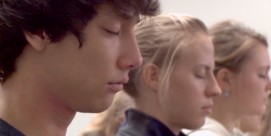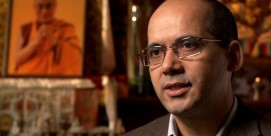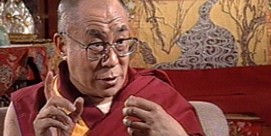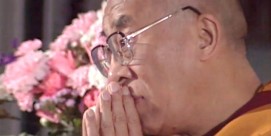WENDY FARLEY (Professor of Religion, Emory University): the parts of Christianity that I study and know best are very oriented to a love ethic, that the ultimate reality is love, and that the Christian path is to participate in that, to recognize in other people this kind of spark to be cherished and cared for… that to delight in the other, in their happiness, to feel compassion for their suffering, that seemed very, very familiar to me. And that... it’s not just an ethic, but a way of seeing the world, a way of experiencing the world, so that when you see the other as something to be cherished, naturally you respond accordingly. So it’s not about obligation so much, as much as this response to a dear one, and that that would be every person. That’s there’s not a limit to it, not a line, but that that’s all of us. I mean that just seems very familiar, that that you… that that’s expressed, not only interpersonally in your circle, but in the public space. It shapes how you respond to public issues, to political issues, that all just seemed very familiar to me.
As long as there’s human beings this ethic is appropriate, and it’s been articulated for thousands of years. But living in a very frightening time there is this sense of intense urgency that we find something to change the way we’re thinking and that organized religions are not doing it. They’re not stepping up, they’re not speaking about poverty, they’re not speaking about war, they’re not speaking about climate change, the religions are not giving us… they’re not doing their job. So this is a… on the one hand a language across traditions, but it’s also… it’s a reminder of what a religion is… who… Christians… remember who you are. You know this is your tradition, this idea of compassion is who you are.
This is the confusion about secularity, it’s not about being secular and not religious, it’s going deeper into your tradition and remembering your tradition is about compassion and when you connect to that taproot, you act differently, you don’t just say oh I’m a Christian, I go to church on Sunday and then I go buy the new electronics and then I… you know, no, you remember who you are and you act in the world with love and care and concern and compassion and sorrow for what’s happening.
I think that… actually Christianity and Buddhism both are, in these last decades, trying to think about how do we communicate our contemplative tradition in a way that isn’t restricted to the monastic community? So that it moves out to lay people who are… it doesn’t presuppose the life of a monastic. And… Christians are doing that with their contemplative practices, you know finding a way to… structure it in a certain way so that you can teach it and… and you can go and do your prayer for 20 minutes or whatever it is, Buddhists are doing that, you know trying to… package it sounds... is the wrong metaphor, but structure it so that you can… in a sense easily hand it on to someone who’s not gonna be a monastic, but who can still benefit from the training of the mind and the heart.
It’s an energy that flows through you and you can practice in a way that there’s a kind of effortlessness to it. Teresa of Avila talks about it as perfume. You know you in your prayer you center on the divine emptiness, you know the… and just doing that work… you… you perfume this love so it’s… so it’s a little bit… it’s different images… happily there’s a lot of different images and vocabularies in the religious traditions, or even in any one tradition, for these things. But I do think that both Buddhism and Christianity… are finding ways of expressing their ancient traditions… in a more lay oriented way.
The modern world has wanted to split theory and practice… split discursive reasoning from ethics, and we’re in a… hopefully a period where those wounds that keep things divided up and fragmented… this is a language for putting them back together, you know to knit things as… integrated, as interdependent, that our… discursive reasoning, our study of text, our study of history, isn’t… doesn’t have to be divorced from the heart, from ethics, from being a complete human being.





